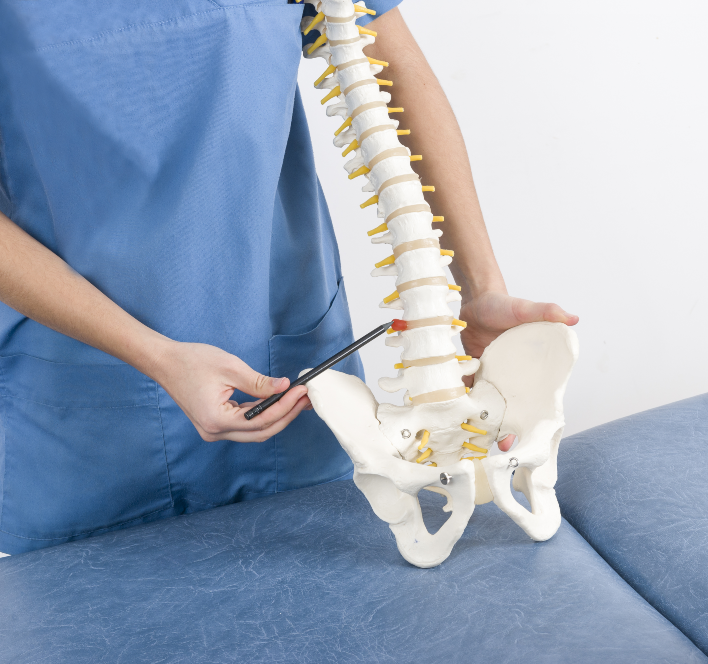Back pain is incredibly common, and for many people it starts gradually. A sore lower back after a long day, stiffness in the morning, or discomfort after lifting something heavy can feel routine. But when…
If you’ve ever had any back pain or know anyone that’s had back pain, then you’ve probably heard of herniated and bulging discs. Oftentimes, people mistakenly think that bulging discs and herniated discs are the same condition. While both can result in pain, there are key distinctions in the level of pain, type of symptoms, and the effects on the spine. It’s important to understand these differences to ensure you receive proper care.
What Is a Bulging Disc?
The spinal column consists of vertebrae and cushion-like discs that are stacked together, allowing the body to move freely and bend or twist with flexibility. These cushion-like discs are shock-absorbing fibers composed of a tough outer layer of cartilage known as the annulus, a jelly-like inner nucleus. They are positioned between each vertebra, preventing them from rubbing together. Over time, these discs may lose strength and become altered in shape, resulting in what’s known as a disc protrusion. That’s why it’s called a bulging disc.
Causes
Bulging discs can happen anywhere along the spine, from the lower back to the mid and upper back. This condition can happen to people of all ages, but it generally impacts aging individuals and those who have participated in long-term levels of physical activity. There is a multitude of reasons why someone might develop a bulging disc, including:
- Poor posture
- Trauma from an accident
- Pre-existing injury/illness
- Inactive lifestyle
- Excessive weight
- Smoking
Symptoms
If you have a bulging disc, you may experience little to no pain. This is because bulging discs only protrude from about 25 percent of a disc, rather than the entire perimeter of it. However, even if you do feel any pain, you likely aggravated the discs through some sort of strenuous activity. Everyone has a different pain tolerance, but you may feel anything from aches to sharp and crippling pain in your neck, shoulders, arms, and hands. The most common symptoms of bulging discs include:
- Numbness or tingling
- Trouble walking
- Muscular weakness
- Muscle spasms
- Cramping
If you notice any of these symptoms worsen, it’s imperative to seek immediate medical attention as these symptoms resemble many similar spinal disorders. Untreated back and neck pain can result in permanent disabilities.
What Is a Herniated Disc?
A herniated disc, on the other hand, is typically more serious than a bulging disc. Essentially, herniated discs occur when the annulus is weakened, causing the nucleus of the disc to slip through and project into the spinal canal. Typically, herniated discs only impact one specific area, whereas a bulging disc may disrupt several. However, herniated discs are known to be far more painful than bulging discs because they protrude further and put pressure on nerve roots.
Causes
One of the most common causes of a herniated disc is degenerative discs disease. As we age, our discs wear out and flatten, putting pressure on other areas of the body for support and making the disc less effective at absorbing shock from movement. However, you can herniate a disc for several other reasons, including:
- Injury
- Overuse
- Improper lifting technique
- Excessive weight
- Smoking
Symptoms
If you have a herniated disc, you may experience no symptoms at all. This is especially true if your disc doesn’t hit any nerves. Those more susceptible to pain usually feel intense discomfort. The most common symptoms herniated discs are known to produce include:
- Sharp sciatica pain
- Numbness or tingling down the arms, legs, and feet
- Muscular weakness
- Loss of bladder or bowel control
- Loss of motion
- Difficulty walking or standing
Treating Bulging and Herniated Discs
General treatment options for patients with mild to moderate pain include rest, physical therapy, anti-inflammatory medications, muscle relaxers, chiropractic care, and steroid injections. When these treatments are unsuccessful in reducing pain, it may be in your best interest to undergo minimally invasive surgery.
Potential minimally invasive treatment options include:
- Artificial disc replacement
- Anterior cervical discectomy
- Radiofrequency ablation
- Lumbar fusion
- Laminectomy
- Lumbar discectomy
Spinal disc disorders can disrupt your life in every way possible. An experienced spine specialist can present a broad array of specialized treatment options to treat your specific condition and pain so that you can get back to living your life to the fullest.
Determine the Source of Your Pain with an Exceptional Medical Team
Individuals with herniated or bulging discs should undergo a comprehensive evaluation to ensure they receive effective treatments, so as to not worsen their condition. The medical team at NJ Spine & Orthopedic—exceptional spine specialists with a multidisciplinary team of doctors, nurses, and surgeons—provides patient-centered, technologically advanced care for patients with disc-related spinal disorders.
From initial diagnosis to specialized treatment and rapid recovery times, patients who seek care from NJ Spine & Orthopedics are guaranteed a comprehensive, integrated care plan to tackle their health issues. To determine the source of your pain today, speak to our board-certified medical team by calling (866) 272-9271 or completing our contact form today!

